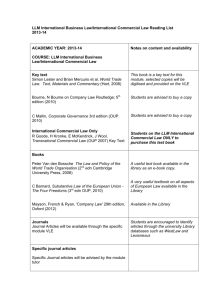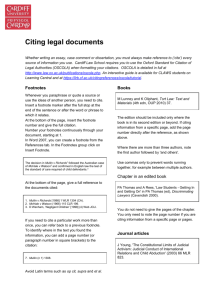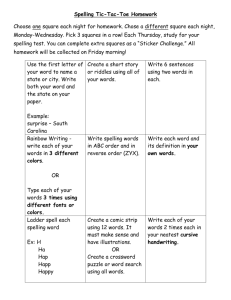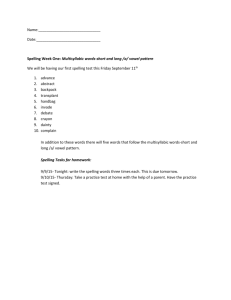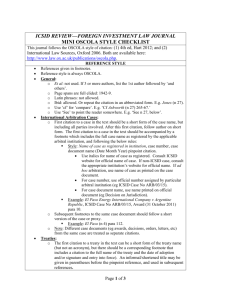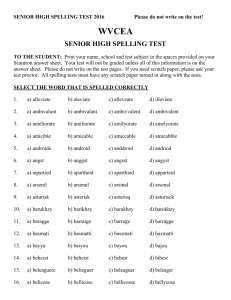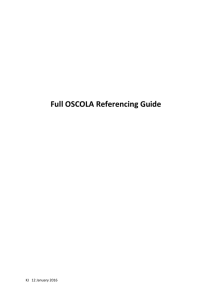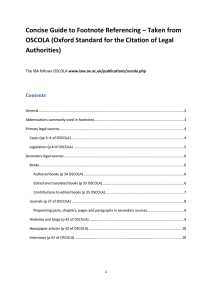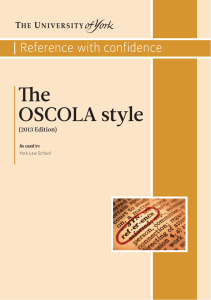Utrecht Journal of International and European Law – Style Guide
advertisement
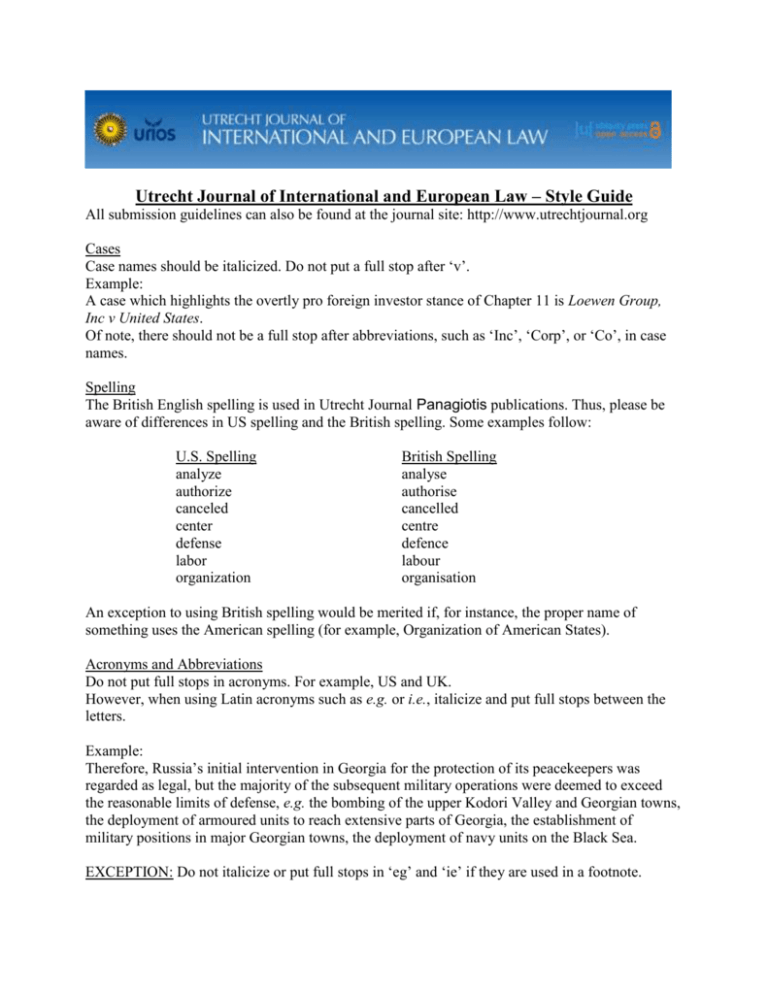
Utrecht Journal of International and European Law – Style Guide All submission guidelines can also be found at the journal site: http://www.utrechtjournal.org Cases Case names should be italicized. Do not put a full stop after ‘v’. Example: A case which highlights the overtly pro foreign investor stance of Chapter 11 is Loewen Group, Inc v United States. Of note, there should not be a full stop after abbreviations, such as ‘Inc’, ‘Corp’, or ‘Co’, in case names. Spelling The British English spelling is used in Utrecht Journal Panagiotis publications. Thus, please be aware of differences in US spelling and the British spelling. Some examples follow: U.S. Spelling analyze authorize canceled center defense labor organization British Spelling analyse authorise cancelled centre defence labour organisation An exception to using British spelling would be merited if, for instance, the proper name of something uses the American spelling (for example, Organization of American States). Acronyms and Abbreviations Do not put full stops in acronyms. For example, US and UK. However, when using Latin acronyms such as e.g. or i.e., italicize and put full stops between the letters. Example: Therefore, Russia’s initial intervention in Georgia for the protection of its peacekeepers was regarded as legal, but the majority of the subsequent military operations were deemed to exceed the reasonable limits of defense, e.g. the bombing of the upper Kodori Valley and Georgian towns, the deployment of armoured units to reach extensive parts of Georgia, the establishment of military positions in major Georgian towns, the deployment of navy units on the Black Sea. EXCEPTION: Do not italicize or put full stops in ‘eg’ and ‘ie’ if they are used in a footnote. Example: 37 See eg G Van Harten, Investment Treaty Arbitration and Public Law (1st edn, OUP, Oxford 2007). Commas Do not put a comma before ‘and’ if it’s ending a list (a list for example: bananas, kiwis and strawberries). (The exception to this would be if removing the comma would cause confusion.) Example: According to Guild and others, this is especially true for the EU Home Affairs agencies, Frontex, Europol and EASO, due to their experimental governance strategies and their areas of intervention.52 Capitalised Words The word ‘State’ in noun form should be capitalised. There will situations where the word ‘State’ is part of another word and will not be capitalised. Note the words in bold in this example: It is through the State system that a ‘previously bewildering conglomeration of bodies is named, categorised, and regulated’ so as to facilitate differential forms of inclusion within the space of the nation, and thus authorise particular practices of statecraft that have exclusionary effects. When the noun ‘state’ is referring to states within the United States, the ‘s’ should not be capitalised. Notice the word in bold text in the example: The tribunal implied that even decisions of state Supreme Courts and the US Supreme Court can be challenged under the NAFTA investor dispute mechanism, even though no such analogous right was extended to domestic investors. Quotes Single quotation marks (‘’) are used for quotes. If a quote or phrase occurs within a quote, use double quotation marks (“”). Examples: This, however, is argued to be ‘a corollary of the spirit that inspired European construction itself’, rather than ‘an anomaly or a transitional situation’. It is on the one hand ‘a more “classic” regulatory agency which assist in the implementation of the EU policy through the provision of technical and informational assistance’. Please note that punctuation occurs outside of the quotation marks unless the original had the punctuation also. Compare the above examples with: Furthermore, it sets out, ‘[t]he Agency and the Member States shall comply with the norms and standards at least equivalent to those set by the EU legislation also when cooperation with third countries takes place on the territory of those countries.’ (Examples are from the Frontex Working Arrangements article by Melanie Fink, published in issue 75 (2012)) Spacing We do not double space between sentences. Single space only, please. If removing double spaces between sentences, the job can be done very quickly by using Find and Replace: Click ctrl + f Click the arrow beside the search field (next to the ‘x’) and select ‘Advanced Find’ When the Find window pops up, click the ‘Replace’ tab In the Find field, click the spacebar twice In the Replace field, click the spacebar once Click ‘Replace All’ Before publishing Check for in-line author references to different sections of the article (example: In Part IV.B, I argue that…) and make sure that they match the Utrecht Journal outline/publication format. Of note, when authors refer to sections within their own work, the sentence should not be in future tense. It should be in present tense. Wrong: In Part V, I will discuss the nature of the UN Human Rights Committee. Correct: In Part V, I discuss the nature of the UN Human Rights Committee. References Manuscripts must be formatted with all references, including URLs, cited within footnotes. Please use OSCOLA formatting when referencing all sources. For the quick guide to OSCOLA formatting, please click here. The full reference information for secondary sources should also then be given at the end of the manuscript as a bibliography, with all entries listed in alphabetical order. The format of these references should match the structure of an OSCOLA bibliography. Please ensure that all DOI numbers are provided for electronic references, where available. Examples of the OSCOLA footnote referencing structure can be found below. For more detailed information on OSCOLA referencing, please see here. Additional information on OSCOLA can be found at http://www.law.ox.ac.uk/publications/oscola.php Primary Source Cases A law report citation typically includes the below. If you are not sure of the abbreviation, you can usually find the citation at the start of the case. Give the party names, followed by the neutral citation, followed by the Law Reports citation (eg AC, Ch, QB). If there is no neutral citation, give the Law Reports citation followed by the court in brackets. If the case is not reported in the Law Reports, cite the All ER or the WLR, or failing that a specialist report. Corr v IBC Vehicles Ltd [2008] UKHL 13, [2008] 1 AC 884 R (Roberts) v Parole Board [2004] EWCA Civ 1031, [2005] QB 410 Page v Smith [1996] AC 155 (HL) When pinpointing, give paragraph numbers in square brackets at the end of the refernce. If the judgment has no paragraph numbers, provide the page number pinpoint after the court. Callery v Gray [2001] EWCA Civ 1117, [2001] 1 WLR 2112 [42], [45] Bunt v Tilley [2006] EWHC 407 (QB), [2006] 3 All ER 336 [1]–[37] R v Leeds County Court, ex p Morris [1990] QB 523 (QB) 530–31 If citing a particular judge: Arscott v The Coal Authority [2004] EWCA Civ 892, [2005] Env LR 6 [27] (Laws LJ) Statutes and statutory instruments Acts are also known as Statutes. The title and date are always included. Each Act has a chapter number, which you can additionally include, along with publisher information if required. Statutory Instruments are also known as Orders, Rules and Regulations. Cite the title and year and SI number. Act of Supremacy 1558 Human Rights Act 1998, s 15(1)(b) Penalties for Disorderly Behaviour (Amendment of Minimum Age) Order 2004, SI 2004/3166 EU legislation and cases Consolidated Version of the Treaty on European Union [2008] OJ C115/13 Council Regulation (EC) 139/2004 on the control of concentrations between undertakings (EC Merger Regulation) [2004] OJ L24/1, art 5 Case C–176/03 Commission v Council [2005] ECR I–7879, paras 47–48 European Court of Human Rights Omojudi v UK (2009) 51 EHRR 10 Osman v UK ECHR 1998–VIII 3124 Balogh v Hungary App no 47940/99 (ECHR, 20 July 2004) Simpson v UK (1989) 64 DR 188 Secondary Sources Books Give the author’s name in the same form as in the publication, with the first name and then the surname provided. Give relevant information about editions, translators and so forth before the publisher, and give page numbers at the end of the citation, after the brackets. Thomas Hobbes, Leviathan (first published 1651, Penguin 1985) 268 Gareth Jones, Goff and Jones: The Law of Restitution (1st supp, 7th edn, Sweet & Maxwell 2009) K Zweigert and H Kötz, An Introduction to Comparative Law (Tony Weir tr, 3rd edn, OUP 1998) Contributions to edited books Francis Rose, ‘The Evolution of the Species’ in Andrew Burrows and Alan Rodger (eds), Mapping the Law: Essays in Memory of Peter Birks (OUP 2006) Encyclopedias Halsbury’s Laws (5th edn, 2010) vol 57, para 53 Journal articles Paul Craig, ‘Theory, “Pure Theory” and Values in Public Law’ [2005] PL 440 When pinpointing, put a comma between the first page of the article and the page pinpoint. JAG Griffith, ‘The Common Law and the Political Constitution’ (2001) 117 LQR 42, 64 Online journals Graham Greenleaf, ‘The Global Development of Free Access to Legal Information’ (2010) 1(1) EJLT < http://ejlt.org//article/view/17 > accessed 27 July 2010 Command papers and Law Commission reports Department for International Development, Eliminating World Poverty: Building our Common Future (White Paper, Cm 7656, 2009) ch 5 Law Commission, Reforming Bribery (Law Com No 313, 2008) paras 3.12–3.17 Websites and blogs Sarah Cole, ‘Virtual Friend Fires Employee’ (Naked Law, 1 May 2009) <www.nakedlaw.com/2009/05/index.html> accessed 19 November 2009 Newspaper articles Jane Croft, ‘Supreme Court Warns on Quality’ Financial Times (London, 1 July 2010) 3
